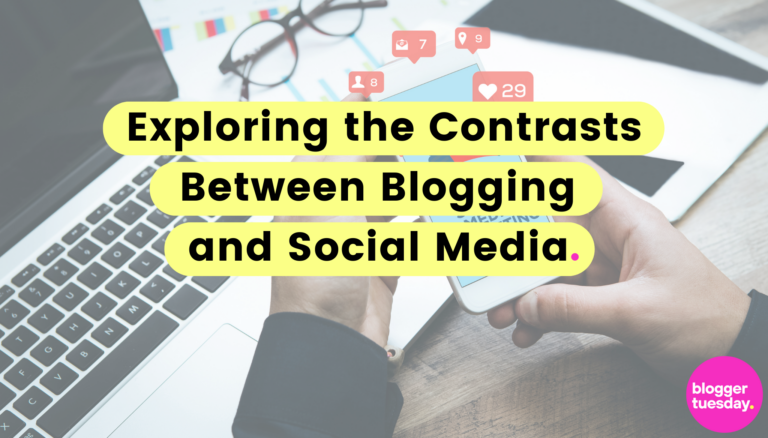In the article below you will find a detailed breakdown of the ways that blogging and social media are similar and how they differ. You will also find out more about the uses and benefits of both forms of content, as well as when to use each one alone, and how to use them together for maximum effect. Keep reading to find out more.
What Is Blogging?
Blogging is a form of online content that began much like a personal diary. Originally blogs were written by individuals describing their lives, feelings or views on specific matters often in a very informal way.

Picture located at Pixabay – License CC0
However, since their inception, blogs have evolved and been picked up as useful marketing and SEO tools for businesses and organisations. Indeed, currently, you’ll be hard-pressed to find any official company website that doesn’t include some kind of blog, even if it’s under the heading of ‘News’ or ‘Articles.’
Reasons Why People Use Blogging As A Vehicle For Their Content
There are many valid reasons to choose blogging as a vehicle to publish their content. They include:
- Blogging builds authority and sets your or your business up as an expert in your industry.
- Blogging helps direct traffic to your website.
- Blogging helps engage your readers.
- Blogging will boost your SEO and help make sure your site gets found online by your target audience.
- Blogging allows you to educate readers on a subject in depth, as well as show and convince them why they need a product or service.
- Blogging can result in more leads and conversions for your business.
What Is Social Media?
Social media is a technology that allows users to enter into, engage and interact with a community online. Social media platforms such as Twitter, Facebook, Instagram, and Snapchat are designed to facilitate the sharing of ideas, information and content across a wide network of people. Currently, just under 60% of the world’s total population uses social media, which equates to around 4.80 billion people, which is a significant audience to have access to!

Image sourced at Pexels – Licence CC0
Reasons Why People Use Social Media As A Vehicle For Their Content
There are also plenty of convincing reasons to use social media platforms to publish your content including:
- Social media builds brand awareness with new potential customers.
- Social media builds brand loyalty with existing customers.
- Social media encourages customer engagement through regular interaction.
- Social media provides access to valuable customer feedback and market research that can be used to inform your business or organisational decisions.
How Are Blogging And Social Media Similar?
Social media and blogging are similar in several important ways, keep reading to find out what they are.
Both Forms Of Content Use Words And Images As A Form Of Communication
Social media and blogging are both types of online content that use words and images to spread ideas and engage their audience. There are indeed differences in the way that this is done with a single blog often using a greater number of words and images than a single social media post. However, just like biscuits and cakes the ingredients are pretty much the same, just used in different proportions depending on the intended outcome.
Both Can Be Used In The Sales Process
Another similarity between social media and blogging is that they can both be used as an effective part of the sales process. Blogs can provide detailed information for potential customers that are still at the awareness stage of the sales funnel, offering them in-depth information that will help answer their questions and reassure them that this is the right product for them.

Image sourced at Pixabay – License CC0
Additionally, calls to action or CTAs as they are also known can be included in blogs to facilitate direct sales, or prompt potential customers to sign up for an email list or newsletter so they can receive more information.
Social media posts on the other hand offer a way to engage with potential customers at the top of the sales funnel and build brand awareness by being part of their social network. Also, social media is ideal for maintaining and nurturing relationships with current customers, as it provides an opportunity for interaction on a regular if not daily basis. Although, this interaction does need to be carefully customised to the target customer, and not too sales heavy as you risk putting them off.
Both Are Undergoing Big Changes Due To AI Right Now
Something that is impacting both the worlds of social media and blogging right now is the rise of AI or Artificial Intelligence. Many applications offer to automate the writing element of both long-form blogs and social media posts, which is currently shaking up both industries in a pretty significant way. Indeed, many who make their living from writing blogs that are worried about how AI will impact their livelihood right now.

Picture sourced at Pexels – Licence CC0
However, before we whip ourselves into a panic over AI, it is worth noting that to be when it comes to the creation of long-form blog content AI needs to receive effective prompts and editing from a human. There are also plenty of interesting, and lucrative paid blogging opportunities out there right now, with many writers finding clients are returning to them after discovering for themselves that AI-generated content is not all it’s cracked up to be.
How Blogging And Social Media Differ
While there are many similarities between blogging and social media, there are also some significant differences that need to be addressed. Find out what they are in the section below.
Word Counts And Character Limits
First of all, one of the most critical differences between social media posts and blogs is the word count or character limit involved. For example, some social media platforms such as Twitter limit single posts to 280 characters for non-premium members. The effect of which is either a condensing of important information or as often happens a situation where info becomes more disjointed with key facts delivered across a series of tweets instead of in one easier-to-consume blog.

Picture found at Pixabay – License CC0
Blogs on the other hand can be any length, although they tend to be over 500 words and up to 3000 words as a rule. Blogs use long-form content for several reasons including providing a better-matched experience for the user that is likely to be looking for in-depth info, providing a vehicle for keywords used in SEO which help the blog get found online, and in some cases to encourage users to stay on the page longer which can impact advertising revenue. With that in mind, if you are looking to provide detailed content to your users, then a blog post is usually the best option as it offers a better user experience.
Unmediated Access To Subscribers
When you publish your content via social media, you are wholly dependent on the platform to mediate between you and your subscribers. What that means is when a platform like Facebook, or Instagram goes down you will no longer have access to your audience, which at best can be frustrating and at worst cost your business a significant amount of revenue.
However, when you blog you can collect the email address of your subscribers which means, even if your blog goes down for some reason, you will still be able to directly access your audience in another way.
The Matter Of SEO
While it can be argued that both social media posts and long-form blog content need to make use of Search Engine Optimisation, the process is much more prevalent in the blogging field. Now, this may be seen as both an advantage and a disadvantage of blogging. For example, having to optimise a blog post for SEO can be seen as an additional task, added to an already much more time-consuming process than putting together a short social media post. Especially if you are tasked with identifying suitable keywords, and crafting meta titles, alt text for images, and H1, H2 and H3 headings.

Picture located at Pixabay – License CC0
However, the benefits that SEO primarily through the medium of blogging, deliver are an advantage that cannot be ignored. Indeed optimising a blog post for SEO means that it is much more likely to rank on the first page of Google, and posts that rank on the first page of Google are the ones that get the most traffic, which is usually the aim (either to educate, inform, convert the reader). In this way, it could be argued that longer-form content like blogs are the superior tool for certain tasks.
Site/Platform Maintenance
One of the biggest benefits of choosing to use a social media platform to host your content is that you do not have to worry about building, or maintaining your site. Instead when using social media all you need to do is set up a profile, which can be as quick as filling in a few lines of info
and you are ready to start uploading content and connecting with your audience.
This is not the case when it comes to blogging, with many people using platforms like WordPress.org which require you to choose a host, and a theme, and build your site up from scratch as well as make sure it’s well maintained and remains secure. Indeed, if bloggers neglect to maintain their sites, they can risk significant cybersecurity dangers such as being hacked, not to mention offering a substance experience to anyone reading their blog.
Email Ownership/Access
Another important difference between social media and blogging is the direct access bloggers get to those that subscribe to their sites. Indeed, self-hosted bloggers using platforms like WordPress can allow subscribers to become email followers which means that every time a new blog post is published the subscriber will get an email alerting them to this which can generate traffic.
Bloggers also have the additional advantage of being able to invite their readers to sign up for a newsletter. This gives bloggers direct access to their subscribers’ email addresses which can then be used for a range of purposes including promoting products, creating brand awareness, or generating sales.
How Blogging And Social Media Can Be Used Together In Tandem
It is wise to remember that blogging and social media do not have to be mutually exclusive. Instead, they can be used together to multiply and enhance the results, which makes using them in tandem often the most effective approach.
Indeed, you can link the detailed and authoritative blogs you write on social media, so the audience you have attracted will be directed to your website. In essence, when it comes to content if you can think of social media as the signpost and the blog to which it links as the destination.
Final Thoughts
Blogging and social media are similar in that they are both types of online content. They can also both be used as part of the sales process, and they are both undergoing big changes right now due to AI.
Blogging and social media differ in that they involve vastly different word and character counts. Also, blogging is better suited to SEO success and offers bloggers direct access to their audience via email. However, social media provides a platform where little set-up and maintenance need to be done. Although, if such a platform does go down, then access to subscribers is lost with it.
At this point, you may expect us to weigh in on whether social media posts or blogs are the better form of content. However, this is missing the point. Instead, the question you need to ask is whether a social media post or a blog is the best content for what you are trying to achieve. Indeed, as with all forms of marketing selecting the option that most effectively will reach your target audience is always the best choice.
Therefore if you are looking for creative, informative, educational content that sets you up as an authority in your field, then a blog is the right tool. However, if you are looking to attract and engage your audience and keep them interacting with your brand, then social media posts are a better option. Yet better than both of these individually is to use your blogs and social media in combination to maximise their effect.


